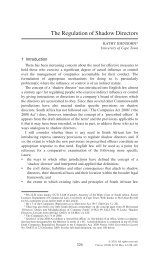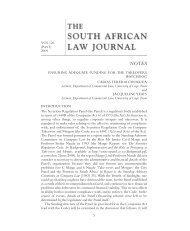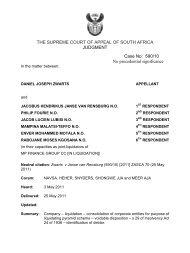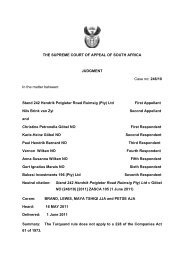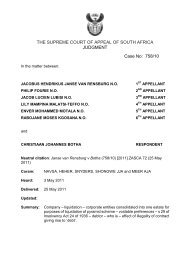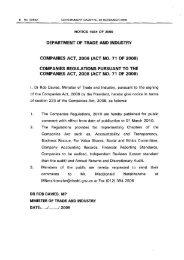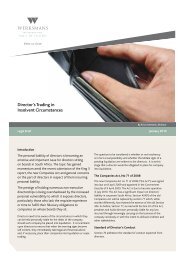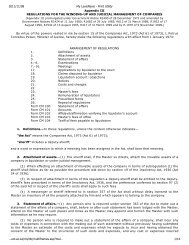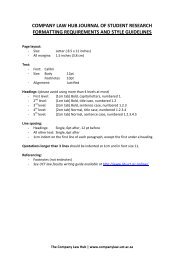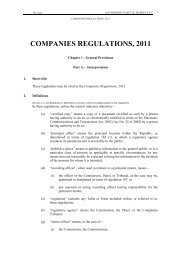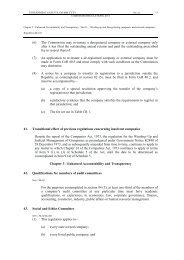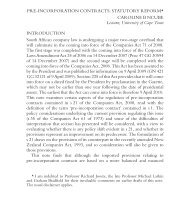Blue Square Advisory Services (Pty) Ltd v Mandingoane and Another
Blue Square Advisory Services (Pty) Ltd v Mandingoane and Another
Blue Square Advisory Services (Pty) Ltd v Mandingoane and Another
Create successful ePaper yourself
Turn your PDF publications into a flip-book with our unique Google optimized e-Paper software.
Page 16<br />
may pass on conclusion of the cession without delivery of share certificates or<br />
transfer forms, Botha v Fick 1995 (2) SA 750 (A). The register of members is<br />
prima facie proof of ownership of the shares, section 109 of the 1973 Act.<br />
The court is entitled to go behind the register to ascertain the identity of the<br />
true owner. Thus where a registered member sold his shares <strong>and</strong> became<br />
insolvent after ownership had passed to the purchaser but before registration<br />
had taken place in the name of the purchaser, the court could go behind the<br />
register <strong>and</strong> make a determination that notwithst<strong>and</strong>ing registration in the<br />
name of the insolvent seller, the shares were not assets in the insolvent seller’s<br />
estate, McGregor’s Trustees v Silberbauer (1891-1892) 9 SC 36. Similarly<br />
upon the death of one of two registered members both of whom held shares as<br />
trustees, without any personal beneficial interest therein, for an overseas bank,<br />
the court could go behind the register to declare that no part of the shares<br />
registered in their names belonged to the deceased estate. No stamp duty was<br />
payable in respect thereof to the master, R<strong>and</strong>fontein Estates <strong>Ltd</strong> v The Master<br />
1909 TS 978.<br />
[35] The concept of a nominee as an agent to hold shares in his name <strong>and</strong><br />
be the registered member on behalf of a nominator or principal, has been<br />
recognised as a convenient <strong>and</strong> accepted practice. The principal whose name<br />
does not appear on the register is usually described as “the beneficial owner”<br />
which is not juristically speaking within the South African legal system,<br />
Oakl<strong>and</strong> Nominees (<strong>Pty</strong>) <strong>Ltd</strong> v Gelria Mining & Investment Co (<strong>Pty</strong>) <strong>Ltd</strong> 1976<br />
(1) SA 441 (A) at 453. This is so because the concept of a “beneficial owner”<br />
is a concept of equitable ownership as distinct from legal ownership applicable<br />
in English trust law but inappropriate to characterise the personal rights of a<br />
beneficiary in a trust or a principal in a principal agent relationship in South<br />
African law. This is a common practice <strong>and</strong> well understood commercially<br />
although the employment of trust terminology is done perhaps in the wide<br />
sense. The courts have gone behind the register to recognise the beneficial<br />
owner’s interest to enforce the rights of the beneficial owner visa a vis the<br />
nominee <strong>and</strong> to compel the nominee to deliver to the beneficial owner the<br />
share certificates together with the necessary transfer documents, St<strong>and</strong>ard



